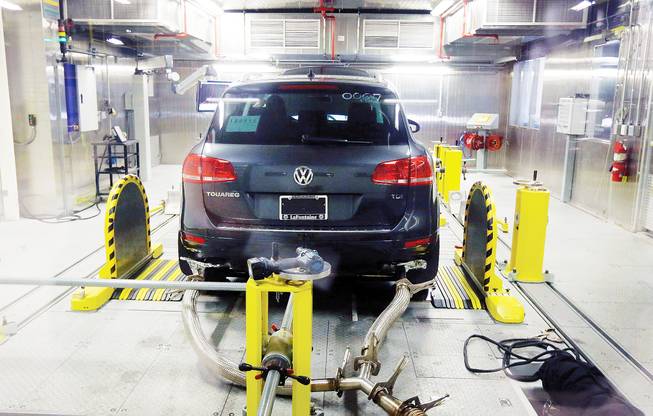
Associated Press
A Volkswagen Touareg diesel is tested in the Environmental Protection Agency’s cold temperature test facility in Michigan. Volkswagen cheated U.S. air pollution regulations, and its vehicles emitted up to 40 times more nitrogen oxide than is allowable in the United States.
Monday, Nov. 21, 2016 | 2 a.m.
Nearly a year after Volkswagen admitted to cheating U.S. air pollution regulations, a federal judge in late October signed a $14.7 billion settlement that provided customers with compensation and an option to sell their cars back to the company. The buyback deal was a major win for consumers and regulators, but a less publicized part of the settlement could have consequences for electric vehicles in Nevada.
Volkswagen is required to pay $2.7 billion into a fund intended to reduce nitrogen oxide emissions, which contribute to poor air quality and increase risks of respiratory disease. From that portion of the settlement agreement, states including Nevada will receive funding that could be used for a variety of environmental remediation activities, such as encouraging electric vehicles.
Most states are in the early process of deciding the focus of their spending once funding starts trickling in toward the end of 2017. Colorado is ahead of the pack, having already conducted a public meeting for advice and now finalizing comments on its allocation of about $61 million.
Nevada will receive about $22.3 million, and it’s in the process of setting up the fund. Before the money can be disbursed, the state must appoint an administrator. Then it will direct an agency, such as the Office of Energy or the Nevada Department of Transportation, to control the fund.
“At this time, the state is preparing to execute the terms of the settlement agreement and has not finalized how the funds will be used,” a spokesperson for the Nevada attorney general’s office said.
The state has several options. Under a broad framework laid out in the settlement, the bulk of the funding must be directed toward making medium and heavy-duty vehicles more efficient. This means replacing old diesel vehicles with ones powered by natural gas or electricity.
Each state is allowed to use 15 percent of the funds to build infrastructure for electric vehicles, which Nevada already has begun doing with charging stations on U.S. Highway 95.
“The Volkswagen funds give states a significant opportunity to support a real market transition toward electric vehicles,” said Will Toor, who directs the transportation program at the Southwest Energy Efficiency Project, a nonprofit organization that advocates for efficiency initiatives. “With the focus on a transition to electric vehicles, you are really creating a significant change that will have a long-term impact.”
Although the state is given leeway to decide how it will spend the funds, Toor said the focus should be on advancing electric vehicles. He said there might be opportunities to “electrify” transit vehicles.
“There would be big benefits that would come in multiple places by moving to electric buses,” he said.
The settlement is intended to help undo the impact of Volkswagen’s effort to dodge emission standards. After on-road testing, it was revealed last year that software in several Volkswagen models had tricked regulators by showing improved performance during pollution tests. The result was that for years Volkswagen engines emitted up to 40 times more nitrogen oxide than what the U.S. allowed.
As part of the settlement, Volkswagen was required to spend an additional $2 billion on developing electric vehicles and investing in infrastructure to support them. In approving the nearly $15 billion settlement, the federal judge called the deal “fair, reasonable and adequate.”

Join the Discussion:
Check this out for a full explanation of our conversion to the LiveFyre commenting system and instructions on how to sign up for an account.
Full comments policy